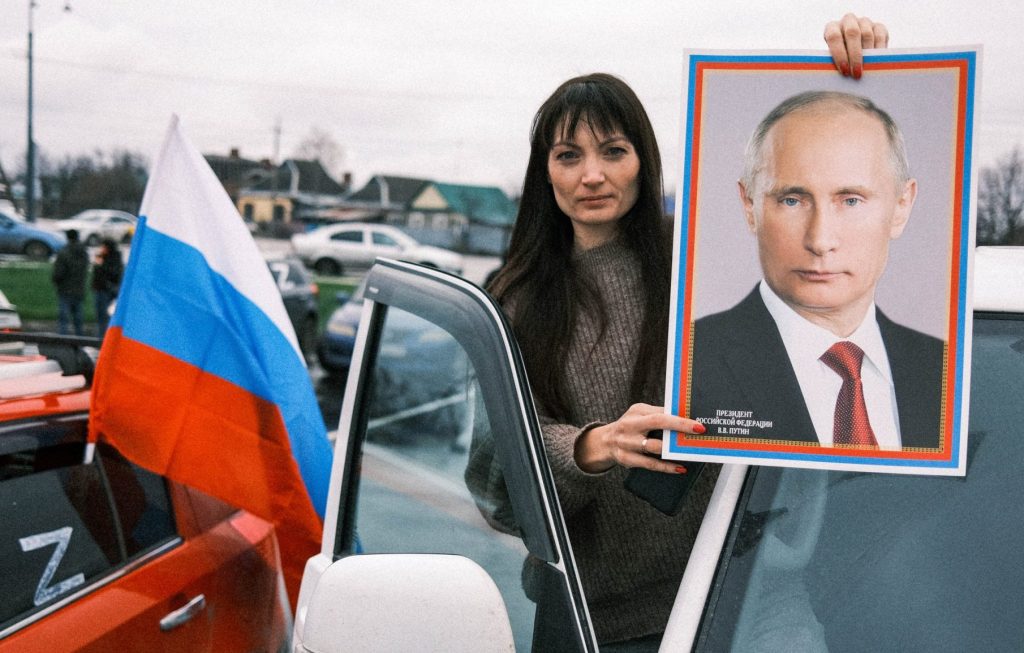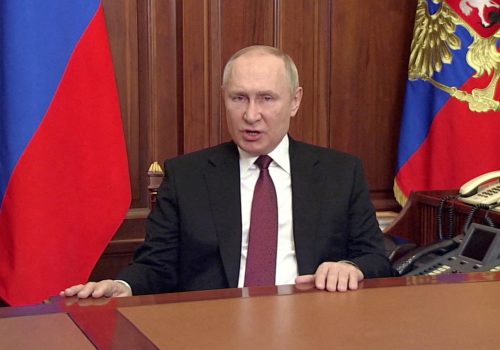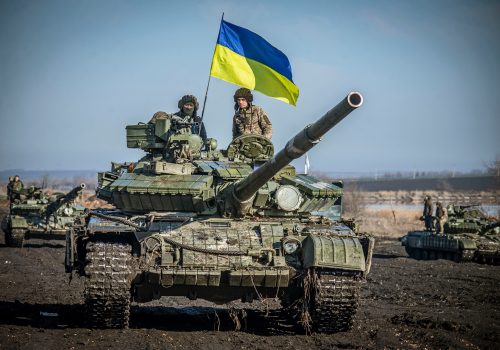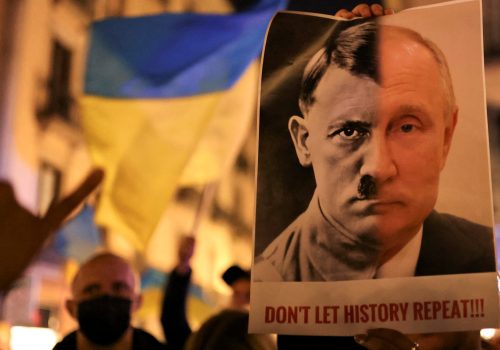Amid the shock and horror of Russia’s Ukraine invasion, many have sought to blame everything solely on Vladimir Putin. As international audiences try to make sense of the unthinkable scenes currently unfolding in the heart of Europe, it is convenient to believe that Putin has simply lost his mind.
There is something reassuring about the idea that the carnage in Ukraine is all down to the criminal insanity of one man. However, talk of “Mad Vlad” is a comforting myth that disguises a far darker reality.
The Russian ruler’s well-documented Ukraine obsession has been instrumental in sparking the largest European conflict since World War II, but his decision to invade Ukraine was no aberration. It entirely consistent with longstanding public statements and foreign policy goals that are enthusiastically embraced by a clear majority of Russians. This is their war just as much as it is Putin’s.
Recent polling data provides the clearest indication of Russian popular support for the war in Ukraine. In the days following the February 24 invasion, Putin’s personal approval rating actually rose to multi-year highs. According to state pollster VTsIOM, his rating jumped six percent in the week ending February 27 to reach 70%. Fellow polling agency FOM recorded a seven percent increase over the same period, bringing approval of Putin to 71%.
While these Kremlin-linked polls suffer from obvious credibility issues, a recent survey carried out by a group of independent research organizations reached strikingly similar conclusions. This nationwide Russian survey was conducted between February 28 and March 3 when the reality of the war was already apparent. It found that around 58 percent of Russians approved of the invasion of Ukraine, while just 23 percent opposed it.
Ordinary Russians have been queuing up to publicly endorse the war effort. The “Z” branding used by Russian troops in Ukraine is becoming increasingly ubiquitous across the country as a shorthand symbol of support, while a rapidly expanding list of public figures and professional collectives have released statements backing the invasion. For example, the heads of 250 Russian universities published an official address by the Union of Russian Rectors on March 4 justifying the war and calling on Russians to rally around Putin.
Stay updated
As the world watches the Russian invasion of Ukraine unfold, UkraineAlert delivers the best Atlantic Council expert insight and analysis on Ukraine twice a week directly to your inbox.
Meanwhile, domestic opposition to the invasion has been underwhelming. Protests have taken place in a number of cities across Russia but these efforts have attracted relatively small crowds and have failed to gain momentum.
While the courage of individual Russian protesters is not in question, it is futile to talk of a significant opposition movement until we see anti-war rallies attracting hundreds of thousands. At present, there no indication that this is likely to happen. Indeed, most Russians seem more concerned by the departure of international consumer brands from the country than by the war crimes being committed by their army in neighboring Ukraine.
Many Russians simply refuse to acknowledge the atrocities that have accompanied Putin’s invasion. Since the onset of hostilities, numerous reports have appeared in the international media recounting how Ukrainians have been unable to convince their Russian relatives that the Russian army is bombing Ukrainian towns and cities.
It is tempting to infantilize the Russian public and argue that they are simply being deprived of accurate information, but this is intellectually dishonest. While the country’s mainstream media is strictly controlled by Kremlin curators, Russians are expert in the art of navigating propaganda and can easily access alternative sources of information if they are so inclined. The chilling truth is that tens of millions of Russians readily accept the Orwellian lies promoted by Kremlin TV and share the sentiments expressed by the country’s pro-war cheerleaders.
Eurasia Center events

Today’s pro-war mood did not emerge overnight. For centuries, Russia has bitterly opposed Ukraine’s struggle for statehood. Instead, Russians have been encouraged to adopt a condescending view of Ukraine as a younger brother in need of discipline and direction.
While folksy expressions of Ukrainian identity have traditionally been tolerated, any attempt to promote the idea of a truly separate Ukrainian nation has been interpreted as a direct attack on Russia and treated accordingly. Despite over three decades of Ukrainian independence, such imperialistic thinking remains alive and well in today’s Russia.
Over the past eight years, the Kremlin has skillfully amplified these deep-seated prejudices and resentments. Since the 2014 seizure of Crimea and Moscow’s military intervention in eastern Ukraine, the Russian public have been spoon-fed a daily diet of disinformation designed to demonize and dehumanize Ukrainians as Nazis and puppets of the West. In Putin’s own words, modern Ukraine has become an “anti-Russia” that poses an existential threat to Russia itself.
In light of majority Russian backing for the invasion, it is unrealistic to expect sanctions or global condemnation to convince Putin of the need for a change in policy. On the contrary, rising costs imposed by the international community will only encourage more Russians to back the war effort and persuade them that the very existence of an independent Ukraine is part of a vast anti-Russian conspiracy. In this alternative reality, mounting hardships will be seen as the inevitable price of defending Russia against foreign enemies.
If the democratic world is serious about stopping Putin, it must abandon any hope of domestic opposition to the war. There will be no palace coups or popular uprisings as long as most Russians continue to share Putin’s unhinged obsession with the subjugation of Ukraine. Instead, the only way to influence Russia is by depriving it of the revenues to fund its war machine while dramatically increasing Ukraine’s ability to defend itself.
Putin’s Ukraine invasion is the defining moment of his entire reign and he enjoys the emphatic backing of the Russian people. He will not back down unless he is bankrupted and bloodied.
Peter Dickinson is Editor of the Atlantic Council’s UkraineAlert Service.
Further reading
The views expressed in UkraineAlert are solely those of the authors and do not necessarily reflect the views of the Atlantic Council, its staff, or its supporters.

The Eurasia Center’s mission is to enhance transatlantic cooperation in promoting stability, democratic values and prosperity in Eurasia, from Eastern Europe and Turkey in the West to the Caucasus, Russia and Central Asia in the East.
Follow us on social media
and support our work
Image: A Russian woman takes part in a rally in support of Putin's Ukraine War. (Nikolai Khizhnyak/TASS via REUTERS)




